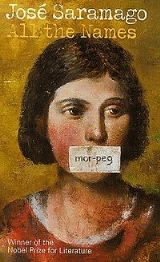
All the Names
Encyclopedia
All the Names is a novel
by Portuguese
author José Saramago
. It was written in 1997 and translated to English in 1999 by Margaret Jull Costa
winning the Oxford-Weidenfeld Translation Prize
.
must include the lives of the living and the dead, the remembered and the forgotten, and the known and unknown. Indeed, this is a recurring theme in Saramago's works.
Another theme is the absurdity of human action. As Saramago puts it:
Novel
A novel is a book of long narrative in literary prose. The genre has historical roots both in the fields of the medieval and early modern romance and in the tradition of the novella. The latter supplied the present generic term in the late 18th century....
by Portuguese
Portugal
Portugal , officially the Portuguese Republic is a country situated in southwestern Europe on the Iberian Peninsula. Portugal is the westernmost country of Europe, and is bordered by the Atlantic Ocean to the West and South and by Spain to the North and East. The Atlantic archipelagos of the...
author José Saramago
José Saramago
José de Sousa Saramago, GColSE was a Nobel-laureate Portuguese novelist, poet, playwright and journalist. His works, some of which can be seen as allegories, commonly present subversive perspectives on historic events, emphasizing the human factor. Harold Bloom has described Saramago as "a...
. It was written in 1997 and translated to English in 1999 by Margaret Jull Costa
Margaret Jull Costa
Margaret Jull Costa is a translator of Portuguese and Spanish fiction and poetry, including the works of Nobel Prize winner José Saramago, Eça de Queiroz, Fernando Pessoa, Javier Marías and José Régio.-Works and awards:...
winning the Oxford-Weidenfeld Translation Prize
Oxford-Weidenfeld Translation Prize
Oxford-Weidenfeld Translation Prize is an annual literary prize for any book-length translation into English from any other living European language...
.
Plot summary
The main setting of the novel is the Central Registry of Births, Marriages and Deaths of some ambiguous and unnamed city. This municipal archive holds the record cards for all residents of the city stretching back endlessly into the past. The protagonist is named Senhor José; the only character to be given a proper name (all of the others are referred to simply by some unique and defining characteristic). Senhor José is around fifty years old and has worked as a low-level clerk in the Central Registry for more than twenty years. His residence, where he lives alone, adjoins the building and contains the only side entrance into it. Lost in the tedium of a bureaucratic job, he starts to collect information about various famous people and decides, one evening, to use the side entrance to sneak in and steal their record cards. On one nocturnal venture he grabs the record card of an "unknown woman" by mistake and quickly becomes obsessed with finding her. Senhor José uses his power as a registry clerk to gather information from her past neighbors and, when it is suggested to look her up in a phone book, he ignores the advice choosing instead to keep his distance. The search begins to consume him and affects his work enough to draw attention from the Registrar, head of the Central Registry, who, strangely, begins to regard Senhor José with sympathy. This special attention given to a clerk by the Registrar is unprecedented in the known history of the Central Registry and begins to worry his fellow employees. Senhor José further neglects his duties as a civil servant and risks his career to pursue a woman he knows basically nothing about.Themes
One of the main themes in All the Names, shown through Senhor José's journey in piecing together the life of the unknown woman and the effects she had on other people/things, as well as the registry's conclusion that the living and dead's files should be put together as one, is that in order to be properly looked at, the human conditionHuman condition
The human condition encompasses the experiences of being human in a social, cultural, and personal context. It can be described as the irreducible part of humanity that is inherent and not connected to gender, race, class, etc. — a search for purpose, sense of curiosity, the inevitability of...
must include the lives of the living and the dead, the remembered and the forgotten, and the known and unknown. Indeed, this is a recurring theme in Saramago's works.
Another theme is the absurdity of human action. As Saramago puts it:
"Strictly speaking, we do not make decisions, decisions make us. The proof can be found in the fact that, though life leads us to carry out the most diverse actions one after the other, we do not preclude each one with a period of reflection, evaluation and calculation, and only then declare ourselves able to decide if we will go out to lunch or buy a newspaper or look for the unknown woman.[1]"

